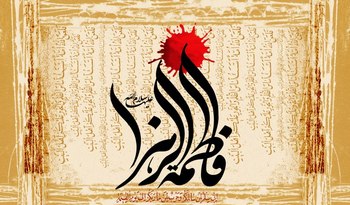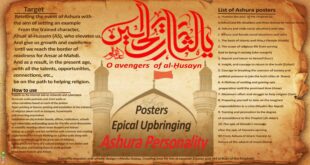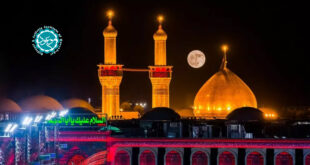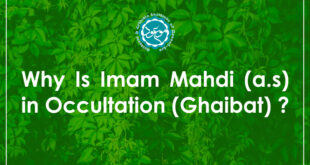Then he said, ‘Do you not bear witness that there is no god but Allah and that Muhammad is His servant and messenger, and that Paradise is true and Fire is true?’
They all said, ‘We bear witness.’
The Prophet (S) said, ‘I will precede you to the pond (in Paradise), and you will come to me at the pond whose wide is as between Sana’a and Busra,36 and it has silver cups as much as the number of stars. See how you will be loyal to me in dealing with the two weighty things!’
Someone asked, ‘O messenger of Allah, what are the two weighty things?’
The Prophet (S) said, ‘The Book of Allah; one side is in the hand of Allah and the other side is in your hands so keep to it, and the other (weighty) thing is my family. The kind, the wise (Gabriel) has told me that they (the Qur’an and my family) will not separate until they will come to me at the pond (in Paradise), and I have asked my Lord to grant me that. Do not precede them lest you perish and do not lag behind them, and do not teach them because they are more knowledgeable than you…’
Then he took Imam Ali’s hand and said, ‘Whoever I am worthier of him than himself, let Ali be his guardian. O Allah, be a guardian to whoever follows him and an enemy to whoever opposes him!’37
Once again when being in the deathbed, the Prophet (S) said to his companions, ‘O people, I am about to die soon and taken. I had advised you to be excused before you. I have left to you the Book of my Lord the Almighty and my progeny the people of my house.’
Then he took Imam Ali’s hand and said, ‘Ali is with the Qur’an and the Qur’an is with Ali. They will never separate until they will come to me at the pond (in the Paradise).’38
This tradition is one of the truest traditions in its sanad39. Al-Manawi quoted from as-Samhudi saying, ‘…in this subject there is more than twenty companions that all of them have narrated this tradition.’40
Ibn Hajar said, ‘This tradition has been narrated in many ways from more than twenty companions.’41
The tradition proves the infallibility of the Ahlul Bayt (a.s.) from any sin or deviation because the Prophet (S) had compared them to the Holy Book of Allah, and of course, every deviation in the conducts of the Ahlul Bayt (a.s.) is considered as a separation from the Book of Allah, whereas the Prophet (S) had announced that they (the Book of Allah and the Ahlul Bayt) would never separate until they would come to him at the Pond in the Paradise.
2. The Tradition of as-Safeenah (the Ark)
Abu Sa’eed al-Khidri said, “I heard the Prophet (S) saying, ‘Verily, the example of my family among you is like the example of the Ark of Noah. Whoever rode on it was saved and whoever lagged behind it drowned and perished. Verily, the example of my family among you is like the Gate of Hitta (repentance) of the Israelites. Whoever entered through it was forgiven.’42
This tradition announces the great importance of the Ahlul Bayt (a.s.) and by keeping to them the nation is saved from drowning in the abysses of life.
Sayyid Sharafuddeen al-Aamily says, “You know that likening them with the Ark of Noah implies that whoever resorts to them in matters related to the creed, deriving the branches and basics of religion from their virtuous Imams, will certainly be saved from the fire of hell, and whoever lags behind them is like one who seeks shelter during the flood with a mountain so that it may save him from Allah’s destiny, but he will eventually be drowned in water while the first will be hurled in the hellfire, may Allah protect us from it.
The reason why they, peace be upon them, are compared to the Gate of Salvation is that Allah has made that Gate a symbol of humility before His Greatness and submission to His Judgment; therefore, it becomes a reason for forgiveness. This is the reason for the similitude. Ibn Hajar, after quoting these and other similar traditions, says, “The reason for their similitude to the Ark is that whoever loves and highly respects them as means of thanking the One Who gave them honors, following the guidance of their learned men, will be saved from the darkness of dissension, and whoever lags behind them is drowned in the sea of ingratitude and will perish in the paths of tyranny.” Then he adds the following: “As to the Gate of Salvation (meaning their similitude to the Gate of Salvation), Allah has made entering that gate, which probably was the gate of Jericho or of Jerusalem, in humility, seeking forgiveness, a reason for salvation, and He (likewise) has made the love to the Ahlul Bayt a reason for this nation’s salvation.”43
3. The Tradition of Amaan
The Prophet (S) said, “Stars are security (amaan) for the inhabitants of the earth against drowning, and my family (the Ahlul Bayt) are security for my nation against dissension (in religious matters). If a tribe among the Arabs differs (regarding religion) from them, they will all then differ and become the party of Iblis.”44
4. The Prophet (S) said to Ali, Fatimah, al-Hasan and al-Husayn (peace be on them), “I declare war against whoever fights you, and peace unto whoever is peaceful to you.’45
Abu Bakr said, “Once, I saw the messenger of Allah leaning on an Arabic bow and inside the tent there were Ali, Fatimah, al-Hasan and al-Husayn. He said, ‘O folks of Muslims, I declare peace unto whoever is peaceful to the people of this tent and a war against whoever fights them, and I am a guardian to whoever follow them. No one loves them except a lucky one, and no one hates them except an unfortunate one of bad birth.’”46
5. Once, the Prophet (S) held al-Hasan and al-Husayn’s hands and said, ‘Whoever loves me, loves these two ones, and their father and mother will be with me in my rank on the Day of Resurrection.’47
6. The Prophet (S) said, ‘Knowing the family of Muhammad gives one salvation from Fire, loving the family of Muhammad makes one pass across the Sirat48, and following the family of Muhammad makes one safe from torment.’49
7. The Prophet (S) said, ‘The two feet of one will not move (on the Day of Resurrection) before he will be asked about four things; about his age how he has spent it, his body how he has worn it out, his wealth on what he has spent it and where from he has gained it, and about our love, we the Ahlul Bayt (a.s.).’50
8. The Prophet (S) said, ‘Make my family among you as the head to the body, and as the two eyes to the head, for the head cannot be guided except by the two eyes.’51
9. The Prophet (S) said, ‘Whoever dies because of his love for the progeny of Muhammad dies a martyr. Whoever dies because of his love for the progeny of Muhammad dies after being forgiven. Whoever dies because of the love for the progeny of Muhammad dies as repentant. Whoever dies because of the love for the progeny of Muhammad dies as a believer of a perfect faith. Whoever dies for loving the progeny of Muhammad will be given the glad tiding of entering the Paradise by the angel of death, and then by Munkar and Nakeer. Whoever dies for loving the progeny of Muhammad will be taken to the Paradise like a bride taken to her groom’s house. Whoever dies for loving the progeny of Muhammad will have two doors in his grave overlooking the Paradise. Whoever dies for the love of the progeny of Muhammad Allah will make his grave a visiting place for the angels of the Merciful One. Whoever dies for loving the progeny of Muhammad dies adhering to the Sunna and the consensus. Whoever dies hating the progeny of Muhammad will come on the Day of Resurrection written between his eyes: “He should despair of Allah’s mercy.’52
The mentioned above are just some of the traditions transmitted from the Prophet (S) and mentioned in the books of Hadith that talk about the virtue and high rank of the Prophet’s progeny including his daughter Fatimah (s.a.).
1. Majma’ az-Zawa’id, vol. 7 p.103, Thakha’ir al-Uqba, p.25, Noor al-Absar, p.101.
2. Hilyat al-Awliya’, vol.3 p.201.
3. As-Sawa’iq al-Muhriqah, p.102.
4. It is the first verse in the Sura that contains the “verse of Mawaddah”.
5. The Life of Imam al-Husayn bin Ali, vol.1 p.68, quoted from Kanzol Ummal, vol.1 p.218.
6. The Life of Imam al-Husayn bin Ali, vol.1 p.67.
7. Tafsir of at-Tabari, vol.25 p.16.
8. Tashahhud is the saying “I bear witness that there is no god but Allah, and I bear witness that Muhammad is His slave and messenger” after the second and the last rak’as of prayers.
9. Tafsir of ar-Razi, vol.7 p.391.
10. Tafsir of ar-Razi, vol.10 p.243, Asbab an-Nuzool by al-Wahidi, p.133, Rawdhat al-Wa’idhin by an-Naysaburi, p.163, Rooh al-Bayan, vol.6 p.546, ad-Durr al-Manthur, vol.6 p.299, Yanabee’ al-Mawaddah, vol.1 p.93, Imta’ al-Asma’, p.502.
11. Iftar is the meal that is taken at sunset to break fasting.
12. Tafsir of ar-Razi, vol.6 p.783, Rawdhat al-Wa’idhin by an-Naysaburi, p.157, al-Khasa’iss al-Kubra, vol.3 p.264, ar-Riyadh an-Nadhirah, vol.2 p.188, Tafsir of ibn Jarir, vol.22 p.334, Musnad of Ahmad bin Hanbal, vol.4 p.107, Sunan of al-Bayhaqi, vol.2 p.150, Mushkil al-Athaar, vol.1 p.334, ad-Durr al-Manthur, vol.5 p.198, Jami’ al-Bayan, vol.12 p.9-12.
13. Mustadrak al-Hakim, vol.2 p.416, Usd al-Ghabah, vol.5 p.521.
14. Ad-Durr al-Manthur, vol.5 p.199.
15. Majma’ az-Zawa’id, vol.9 p.169, Ansab al-Ashraf, vol.1 p.157.
16. Thakha’ir al-Uqba, p.24.
17. Mustadrak al-Hakim, vol.3 p.172.
18. Tafsir of ar-Razi, vol.2 p.699, Tafsir of al-Baydhawi, p.76, Tafsir al-Kashshaf, vol.1 p.49, Tafsir Rooh al-Bayan, vol.1 p.457, Tafsir al-Jalalayn, vol.1 p.35, Sahih of Muslim, vol.2 p.47, Musnad of Ahmad bin Hanbal, vol.1 p.185, Masabeeh as-Sunna, vol.2 p.201, Siyer A’lam an-Nubala’, vol.3 p.193, Sunan of at-Tarmithi, vol.2 p.166, Sunan al-Bayhaqi, vol.7 p.63.
19. Najran was the place where the Christians lived.
20. Noor al-Absar, p.100.
21. Mustadrak al-Hakim, vol.3 p.153, Usd al-Ghabah, vol.5 p.522, al-Isabah, vol.8 p.159, Tahthib at-Tahthib, vol.12 p.441, Kanzol Ummal, vol.6 p.219, Fadha’il al-Khamsah min as-Sihah as-Sittah, vol.3 p.156, Mizan al-I’tidal, vol.1 p.525.
22. Mizan al-I’tidal, vol.2 p.72, and in Tahthib at-Tahthib, vol.1 p.442 it is mentioned, ‘Allah is pleased for your pleasure and displeased for your displeasure.’
23. Sahih of al-Bukhari, vol.4 p.210, 219, Kanzol Ummal, vol.12 p.112, Faydh al-Qadeer, vol.4 p.554.
24. Musnad of Ahmad bin Hanbal, vol.4 p.328, Hilyat al-Awliya’, vol.2 p.40, Sahih of al-Bukhari, vol.6 p.158.
25. Kanzol Ummal, vol.12 p.111, Mustadrak al-Hakim, vol.3 p.154.
26. Sahih of at-Tarmithi, vol.2 p.19, Musnad of Ahmad bin Hanbal, vol.4 p.5.
27. Mizan al-I’tidal, vol.2 p.131.
28. Thakha’ir al-Uqba, p.48.
29. Noor al-Absar, p.41.
30. As-Sawa’iq al-Muhriqah, p.109.
31. Fara’id as-Simtayn, vol.2 p.66.
32. Bihar al-Anwar, vol.74 p.95.
33. Ar-Riyadh an-Nadhirah, vol.2 p.209.
34. Sahih of at-Tarmithi, vol.2 p.308.
35. Kanzol Ummal, vol.1 p.84, Sahih of at-Tarmithi, vol.2 p.308.
36. Sana’a is the capital of Yemen and Busra is a town in Syria.
37. Majma’ al-Haythami, vol.9 p.163.
38. As-Sawa’iq al-Muhriqah, p.75.
39. Sanad is the chain of authorities (narrators) which is the essential part in the transmission of a tradition.
40. Faydh al-Qadeer, vol. 3 p.14.
41. As-Sawa’iq al-Muhriqah, p.36.
42. Majma’ az-Zawa’id, vol.9 p.168, Mustadrak al-Hakim, vol.2 p.43, Tareekh Baghdad, vol.2 p.119, Hilyatul Awliya’, vol.4 p.306, Thakha’ir al-Uqba, p.o20.
43. Al-Muraja’at, p.77.
44. Ar-Riyadh an-Nadhirah, vol.2 p.52, and like it in Sahih of al-Bukhari, vol.2 p.319 and Sunan ibn Majah, vol.1 p.52.
45. Musnad of Ahmad bin Hanbal, vol.1 p.77, Sahih at-Tarmithi, vol.2 p.301, Tahthib at-Tahthib, vol.10 p.43.
46. Mawsoo’at Imam Ameerul Mo’minin, vol.1 p.190, Fara’id as-Simtayn, vol.2 p.40, Sharh al-Akhbar, vol.3 p.515.
47. Musnad of Ahmad bin Hanbal, vol.1 p.77, Sahih at-Tarmithi, vol.2 p.301.
48. Sirat is the bridge that dominates Hell.
49. Al-Muraja’at, p.54, the Life of Imam Ameerul Mo’minin, vol.1 p.123.
50. Al-Muraja’at, p.58.
51. Mawsoo’at al-Imam Ameerul Mo’minin, vol.1 p.191, al-Muraja’at, p.58 quoted from ash-Sharaf al-Mu’abbad.
52. Al-Muraja’at, p.59, quoted from ath-Tha’labi when interpreting the Verse of Mawaddah in his at-Tafsir al-Kabeer.
 Mouood Mouood English Edition
Mouood Mouood English Edition




